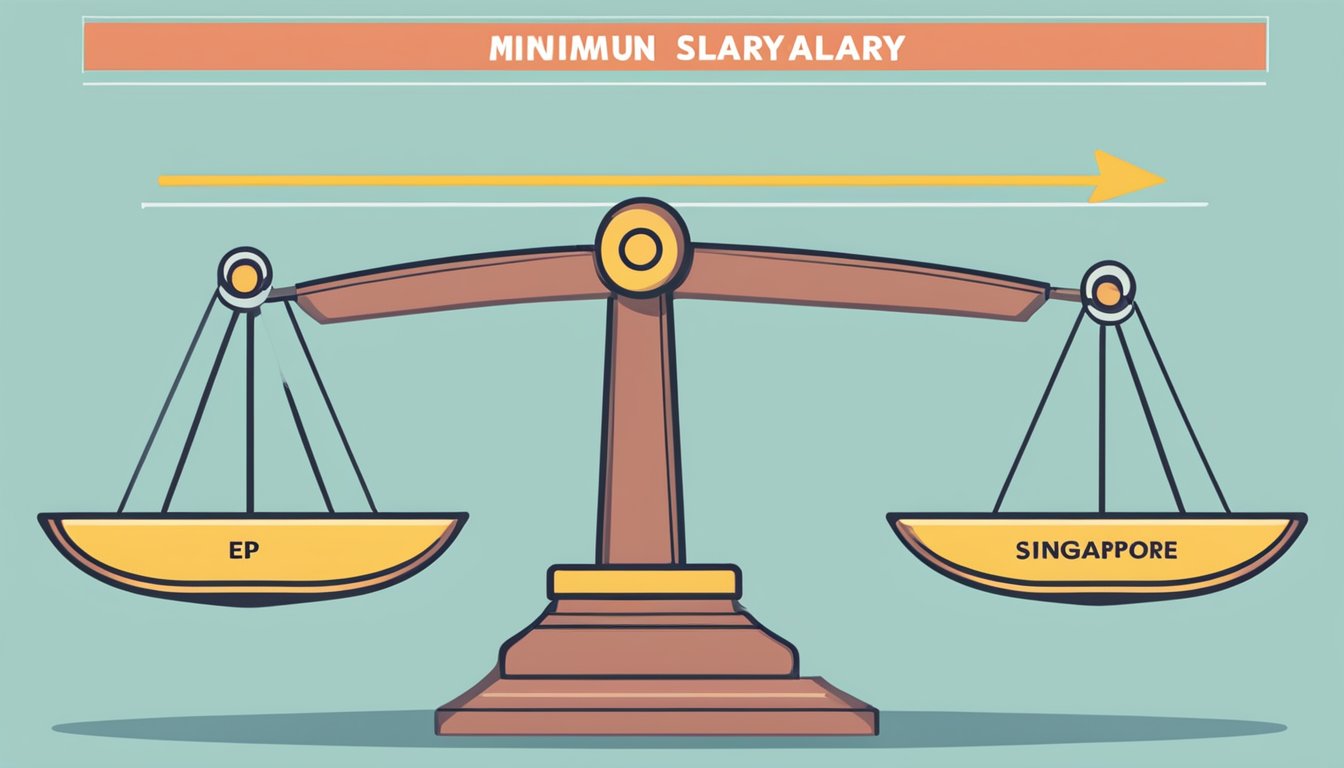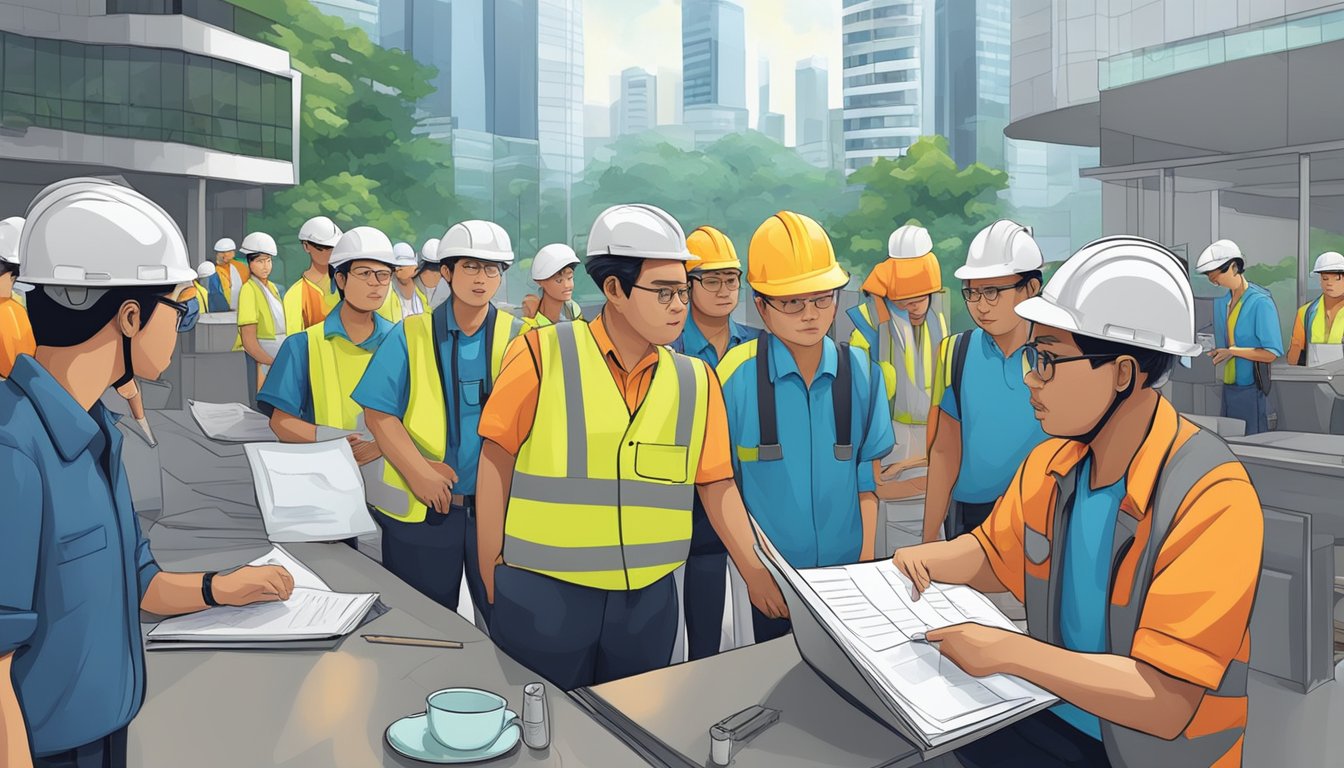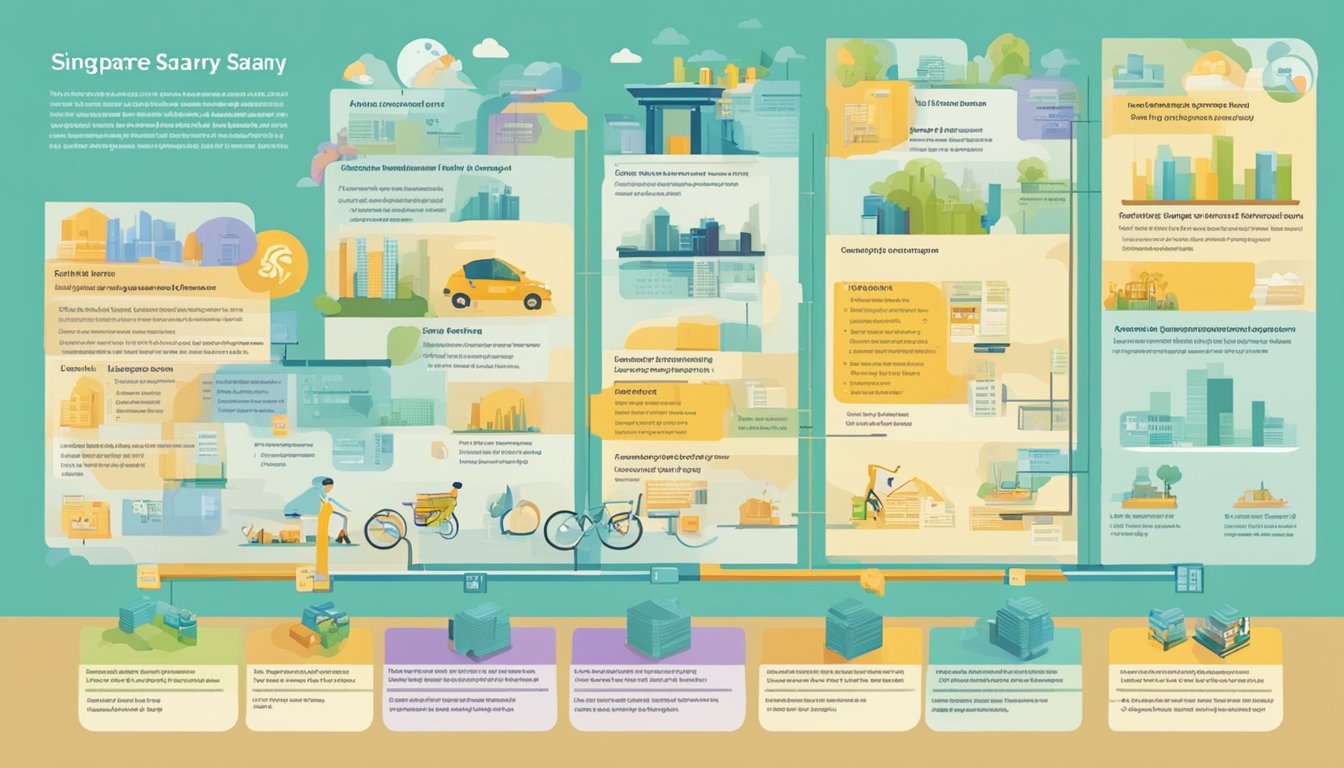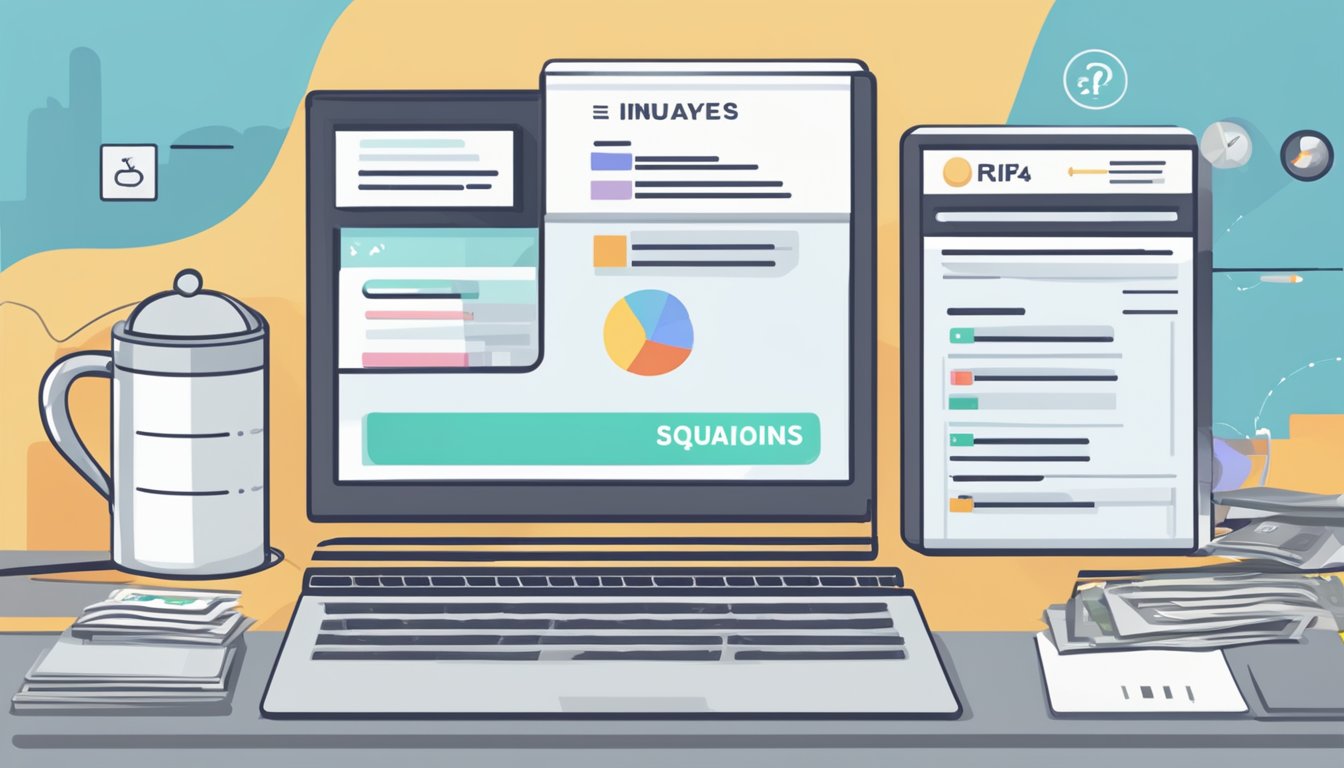Introduction

If you are planning to work in Singapore as a foreign professional, you may have heard of the Employment Pass (EP). This is a work visa that allows foreign professionals to work in Singapore. However, to be eligible for an EP, you must meet certain requirements, including a minimum qualifying salary.
Understanding the Employment Pass
The EP is a work visa issued by the Ministry of Manpower (MOM) to foreign professionals who wish to work in Singapore. It is usually issued to professionals who possess a degree or diploma, have relevant work experience, and earn a minimum monthly salary. The EP is valid for up to two years and can be renewed thereafter.
Minimum Qualifying Salary for EP
The minimum qualifying salary for EP depends on several factors, including the applicant’s age, qualifications, and work experience. From September 2023, the minimum qualifying salary for EP will be at least $5,000 for all sectors except financial services. The minimum salary for financial services will be higher and will increase progressively with age from age 23, up to $18,000 at age 50 and above.
Key Takeaways
- The Employment Pass is a work visa issued to foreign professionals who wish to work in Singapore.
- To be eligible for an EP, foreign professionals must meet certain requirements, including a minimum qualifying salary.
- The minimum qualifying salary for EP varies depending on the applicant’s age, qualifications, and work experience.
Understanding the Employment Pass

If you are a foreign professional looking to work in Singapore, you may need to apply for an Employment Pass (EP). The EP is a work visa that allows foreign professionals to work in Singapore. In this section, we will discuss the eligibility criteria for EP holders and the EP application process.
Eligibility Criteria for EP Holders
To be eligible for an EP, you must meet certain qualifications. The Ministry of Manpower (MOM) sets the eligibility criteria for EP holders. The criteria include:
- A minimum qualifying salary of $5,000 per month (from September 2023).
- Relevant educational qualifications.
- Relevant work experience.
- A job offer from a Singapore-registered company.
EP holders are usually foreign professionals who hold executive, managerial, or specialised jobs. The EP is valid for up to two years and is renewable.
EP Application Process
To apply for an EP, you must follow the EP application process. The process includes:
-
Check your eligibility: Before applying for an EP, you must check if you meet the eligibility criteria. You can use the MOM’s self-assessment tool to check your eligibility.
-
Submit your application: You can submit your EP application online using the MOM’s EP Online system. You will need to provide your personal and employment details, as well as your educational qualifications and work experience.
-
Wait for the outcome: The MOM will process your application and inform you of the outcome. The processing time for EP applications is usually three weeks.
-
Collect your EP: If your application is approved, you can collect your EP from the MOM. You will need to bring your passport and other relevant documents.
In conclusion, the EP is a work visa that allows foreign professionals to work in Singapore. To be eligible for an EP, you must meet certain qualifications, including a minimum qualifying salary of $5,000 per month (from September 2023). To apply for an EP, you must follow the EP application process, which includes checking your eligibility, submitting your application online, waiting for the outcome, and collecting your EP.
Minimum Qualifying Salary for EP

If you are planning to work in Singapore, you will need to obtain an Employment Pass (EP). The EP is a work visa that allows foreign professionals to work in Singapore. To be eligible for an EP, you must meet certain requirements, including a minimum qualifying salary.
Current EP Qualifying Salary
As of 2024, the minimum qualifying salary for an EP is $5,500 per month. However, this number increases progressively from age 23, up to $11,500 at age 45 and above. If you are renewing your EP expiring on 1 December 2023, you need to earn at least $5,000 if you do not work in the financial services sector.
Salary Benchmarks Across Sectors
The minimum qualifying salary for an EP varies across different sectors. In the financial services sector, the minimum qualifying salary is higher, at $5,500 per month. This is because the salaries in this sector are generally higher than in other sectors.
To ensure that EP holders are paid fairly, the Ministry of Manpower (MOM) has set specific salary values for each sector. These salary benchmarks are based on the prevailing local wages for each sector and are regularly reviewed to ensure that they remain relevant.
If you are applying for an EP, it is important to check the specific salary benchmark for your sector to ensure that you meet the minimum qualifying salary requirement. This will increase your chances of getting your EP application approved.
In summary, the minimum qualifying salary for an EP in Singapore is $5,500 per month, with higher salary benchmarks in the financial services sector. By meeting the specific salary benchmark for your sector, you can increase your chances of obtaining an EP and working in Singapore.
Impact on Singapore’s Workforce

Local Employment and PMET Workforce
The increase in the minimum qualifying salary for Employment Pass (EP) applicants will impact the local workforce, particularly Singaporeans. With the new salary threshold of $5,500 for the financial services sector, EP applicants who do not meet the new requirement may find it difficult to secure a job in Singapore. This may lead to a decrease in the number of EP holders and an increase in local employment.
The increase in the minimum qualifying salary for EP applicants will also impact the PMET (Professional, Managerial, Executive and Technical) workforce. With the new salary threshold, EP holders who do not meet the new requirement may have to leave Singapore. This may lead to a decrease in the number of PMET workers in Singapore.
Diversity and Inclusion Initiatives
While the increase in the minimum qualifying salary for EP applicants may have an impact on the local workforce and PMET workforce, it is part of the government’s efforts to promote diversity and inclusion in the workforce. The increase in the minimum qualifying salary for EP applicants will encourage employers to hire more local talent and provide support for local employment.
Additionally, the increase in the minimum qualifying salary for EP applicants will also support the government’s efforts to increase local PMET salaries. With the new salary threshold, EP holders who do not meet the new requirement may have to leave Singapore. This may lead to a decrease in the number of PMET workers in Singapore, but it will also encourage employers to offer higher salaries to local PMET workers.
In conclusion, the increase in the minimum qualifying salary for EP applicants will have an impact on the local workforce and PMET workforce, but it is part of the government’s efforts to promote diversity and inclusion in the workforce and support for local employment.
Government Policies and Frameworks

If you are an employer in Singapore, it is essential to be aware of the government policies and frameworks related to Employment Pass (EP) minimum salary requirements. In this section, we will discuss two critical frameworks that you need to know: Complementarity Assessment Framework (Compass) and Fair Consideration Framework.
Complementarity Assessment Framework (Compass)
The Complementarity Assessment Framework (Compass) is a policy introduced by the Singapore government to ensure that foreign workers complement and do not displace Singaporean workers. The framework assesses the quality and value of the foreign workforce, including EP holders, against the local workforce’s top one-third of professionals, managers, executives, and technicians (PMETs).
As part of the Compass policy, the EP minimum qualifying salary was raised from $4,500 to $5,000. The increase will ensure that EP holders are comparable in quality to the top one-third of local PMETs. The changes came into effect on 1 September 2023, and they apply to all new EP applications and EP renewals.
Fair Consideration Framework
The Fair Consideration Framework (FCF) is another government policy that aims to ensure that Singaporean workers have fair access to job opportunities. The FCF requires employers to advertise job vacancies on the national job board, MyCareersFuture, for at least 28 days before submitting an EP application.
The FCF also requires employers to consider Singaporeans fairly for job vacancies before hiring foreign workers. Failure to comply with the FCF may result in the rejection of EP applications and revocation of work passes.
Conclusion
As an employer, it is crucial to understand the Complementarity Assessment Framework (Compass) and Fair Consideration Framework policies related to EP minimum salary requirements. These frameworks aim to ensure that foreign workers complement and do not displace Singaporean workers and that Singaporean workers have fair access to job opportunities. By complying with these policies, you can avoid the rejection of EP applications and revocation of work passes.
Future Trends and Economic Outlook

As Singapore continues to grow and evolve, so too do the challenges it faces. In order to stay competitive in a global marketplace, it’s important to stay ahead of the curve and adapt to changing market conditions. Here are a few future trends and economic outlooks to keep in mind.
Adapting to Global Competition
With the rise of global competition, Singapore must be prepared to adapt to changing market conditions. This means staying on top of the latest trends and innovations in order to remain competitive. One key area of focus is skill shortages. As demand for highly skilled workers continues to rise, it’s important to invest in education and training to ensure that the workforce is equipped to meet these demands.
Innovation and Manpower-Efficient Solutions
Another area of focus is innovation and manpower-efficient solutions. By investing in new technologies and processes, Singapore can increase productivity and reduce costs. This can help to make Singapore more competitive in a global marketplace, while also improving the quality of life for workers.
In order to achieve these goals, it’s important to focus on productivity. By increasing productivity, Singapore can reduce costs and improve efficiency. This can help to make Singapore more competitive in a global marketplace, while also improving the quality of life for workers.
Overall, Singapore’s economic outlook is positive. With the right investments and strategies, Singapore can continue to grow and thrive in a global marketplace. By staying ahead of the curve and adapting to changing market conditions, Singapore can remain a leader in innovation and productivity, while also improving the quality of life for its workers.
Frequently Asked Questions

What’s the latest minimum salary requirement for obtaining an Employment Pass in Singapore?
The latest minimum salary requirement for obtaining an Employment Pass in Singapore is $4,500 per month. This requirement was implemented in 2023 as part of the government’s efforts to ensure that foreign talent complements rather than substitutes local talent.
How can one determine if they’re eligible for an Employment Pass?
To determine if you’re eligible for an Employment Pass, you can use the Ministry of Manpower’s Self-Assessment Tool. This tool takes into account factors such as your salary, educational qualifications, work experience, and job scope.
What are the common reasons for Employment Pass application rejections?
Common reasons for Employment Pass application rejections include insufficient salary, lack of relevant work experience, and inadequate educational qualifications. It’s important to ensure that you meet all the eligibility criteria before submitting your application.
How can I check the status of my Employment Pass application in Singapore?
You can check the status of your Employment Pass application in Singapore by logging into the Ministry of Manpower’s EP Online portal. You’ll need to have your SingPass or CorpPass credentials to access the portal.
Could you explain the COMPASS framework in the context of Singapore’s Employment Pass?
The COMPASS framework is a tool used by the Ministry of Manpower to assess the eligibility of Employment Pass applicants. It takes into account factors such as salary, qualifications, diversity, support for local employment, skills bonus, and strategic economic priorities bonus. The higher your score on the COMPASS framework, the greater your chances of obtaining an Employment Pass.
What are the salary criteria for permanent residency in Singapore?
The salary criteria for permanent residency in Singapore vary depending on your educational qualifications and work experience. Generally, you’ll need to have a monthly salary of at least $6,000 to be eligible for permanent residency. However, if you have exceptional qualifications or work experience, you may be eligible even if your salary is lower.




